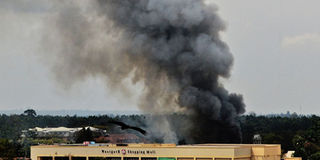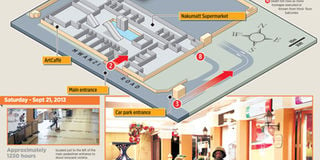Security agencies failed in the face of Westgate Mall attack

Smoke rises from the Westgate Mall in Nairobi on September 23, 2013. The Westgate Shopping Mall attack last September in which 67 people were killed resulted from a catastrophic and systemic failure by Kenya’s security agencies, analysts believe. AFP FILE PHOTO |
What you need to know:
- The government believes that the planning for the logistics of the attack took place at the Kakuma refugee camp.
- The National Intelligence Service has taken the main force of the criticism for failing to infiltrate the plotters and prevent the attack.
- In conversations with government officials briefed on security, the technocrats don’t seem to have faith in the politicians’ willingness to reform the security systems and take the measures necessary to secure the country.
- After public pressure, President Kenyatta last September promised a judicial commission of inquiry into the Westgate attack, whose formation is still awaited.
The Westgate Shopping Mall attack last September in which 67 people were killed resulted from a catastrophic and systemic failure by Kenya’s security agencies, analysts believe.
Failure to detect the terrorist plot, to investigate and stop it were symptomatic of deeper failures of performance and coordination among security agencies, the analysts, some of them in government service, said.
The victims were of 13 nationalities.
Two of the attackers are believed to have flown from Somalia to Entebbe and travelled by road to Nairobi.
The weapons they used were hidden in Eastleigh, as were the terrorists themselves.
On the day of the attack, they drove across the city with their weapons undetected.
Each had an AK-47 rifle, grenades and an ammunition pouch with eight magazines of 30 rounds each, or 240 bullets. In short, the four had enough bullets to kill 1,000 shoppers.
The government believes that the planning for the logistics of the attack took place at the Kakuma refugee camp.
At Westgate, security was provided by unarmed guards from a private company. With the exception of a few APs guarding the two banks at the shopping complex, the mall was virtually unprotected against an armed assault.

GRAPHIC | MICHEAL MOSOTA |
The National Intelligence Service has taken the main force of the criticism for failing to infiltrate the plotters and prevent the attack. The military has also been criticised for a ham-fisted response that resulted in a long siege, the partial destruction and looting of the mall while it was under military control and the relatively high casualty rate.
But an even bigger concern is the loss of effective border control, meaning that the government does not always know who is being allowed into the country.

This screen grab released on Ocotber 18, 2013 and taken from closed circuit television shows an armed man (L) during the attack at the Westgate mall in Nairobi on September 21, 2013. At least 67 people were killed in the four-day siege and the Kenyan Red Cross lists 23 people as missing. AFP PHOTO |
AL-SHABAAB HAVEN
A computerised immigration system has not been implemented at all border points. There is also loss of control over refugee areas — which are sometimes used as havens for Al-Shabaab — and Eastleigh, which if often the staging ground for terrorism.
In conversations with government officials briefed on security, the technocrats don’t seem to have faith in the politicians’ willingness to reform the security systems and take the measures necessary to secure the country.
First, the politicians do not seem to have good strategies to protect Muslims from stigma, while at the same time enlisting the support of the community in fighting the radicalisation of the youth. Political engagement is a little more than populism and politicking.
Secondly, strong civil society action has driven counter-terrorism work underground. While NGOs, which happen to be strongly active in terrorism cases, are important in protecting the rights of suspects — some who are innocent — they have also created the temptation for illegal or extra-judicial actions among law enforcement officers.

President Uhuru Kenyatta with Deputy President William Ruto and Defence Secretary Raychelle Omamo address the nation from State House, after the end of the Westgate Mall siege in September last year. PHOTO | FILE | NATION MEDIA GROUP
Also pointed out is the fact that the government’s intention to create a security buffer zone between Kenya and Somalia has been defeated by the pattern of deployment of KDF. After moving into Somalia, soldiers were deployed in Lower and Middle Juba and not in the third province bordering Kenya, Gedo. This province, and Mandera, have become a corridor of terror, through which Al-Shabaab operatives and weapons, including homemade bombs from the Somali hinterland, are moved into cities.
After public pressure, President Kenyatta last September promised a judicial commission of inquiry into the Westgate attack, whose formation is still awaited.
INTERNATIONAL RELATIONS
An investigation by two parliamentary committees, the Departmental Committee on Defence and Security and the one on international relations, was in the opinion of many, not an effective review of the operations of the country’s security agencies in the period before and during the attack.
In conversations with government officials, it became apparent that no professional, administrative review has been conducted on the way the government and its agencies handled Westgate and, therefore, there has been no organised attempt to address the failures which resulted in the attack.





